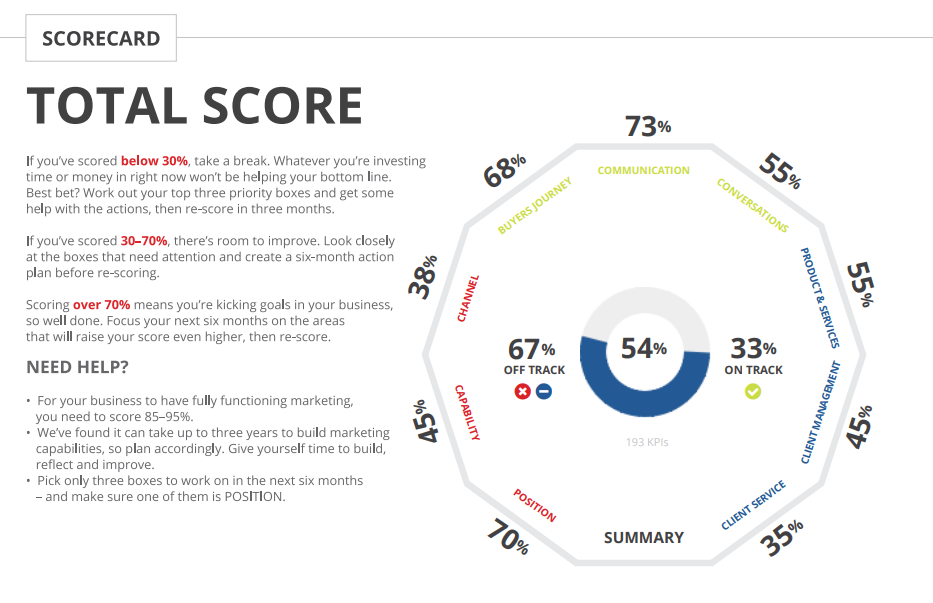Some of the top business leaders in the world say “70-90% of my time is spent on strategising –
in my office with the door shut – about growing the company; how to sell more, how to reach new markets, how to support our field reps, how to attract top-notch consultants from across the country.” Many small-business owners and leaders don’t spend the time they should thinking about their business, they spend their time being a doer in their business. But as this example demonstrates, thinking about the business, strategising about it, is the most important work you can do.
In a high-performance organisation you devote 20% to 100% of your time purely on strategic work. We tell our clients in one of our initial conversations with them that the most important change they can make is to find 3 to 5 hours a week to work on the business, not just in it. Most owners complain that they don’t have the time for this. With some simple pointers we often show them that this is possible. Clients who do this nearly always exceed their expectations. Others achieve some success, but fail to become all they can be.
An important aspect of establishing a high-performance environment is to hold monthly business development meetings. We suggest a monthly meeting held at the same time and place. This should become routine. Further, we suggest that each person at the meeting spend around 5 minutes answering these questions before getting to the rest of the points on the agenda.
1. What’s the best change or improvement in the way business is done that you have noticed this past month?
2. What issue/idea of yours does not yet appear on the master plan?
3. What issue/idea on the master plan do you consider our top priority?
4. What action plan will you pledge to write during the next 30 days?
Once this meeting has become a permanent part of your business culture, indeed a ritual, you can go on vacation. When you come back there will be no unresolved issues on your desk, only implemented action plans. Repeated and consistent self improvement has been the trademark of successful companies, enterprises, governments, and religions since the beginning of civilisation. If you don’t change the way you do and think about things, and improve these then you will fail or become obsolete.
Very often, when success in less than optimal, it can be traced to the client not setting time aside, religiously, to do strategic work. Some clients fail to meet regularly with their managers, and/or the managers fail to meet regularly with their employees. While some people refer to meetings as a waste of time, leadership means meetings. Your job as the owner is to listen (not to dictate or to dominate), to support, to inspire, and to provide your employees with all they need to get their well-documented and well-defined tasks accomplished.
From our perspective, monthly business development meetings call for everyone to write an action plan per month, forever. In time you will have so many ideas documented that it becomes an exercise in improving existing action plans. For example an action plan may create a standard for meetings, such as a published agenda, no more than four items on the agenda, and no more than 15 minutes for each item. Notice that the four questions appearing above find their way into this action plan. Notice that question no. 1: “What’s the best change or improvement you have noticed this past month?” sets up a positive tone for these meetings.
Over time, monthly business development meetings invariably result in every employee coming to realise that each of us has issues, we can’t expect others to solve all our problems for us, we need to prioritise, and take accountability for some of our own issues; to contribute, or to be silent.
Establishing a high-performance organisation not only requires that you continue on a learning path, but also that you enable those around you to grow. We advocate four steps on the journey toward creating this organisation: 1) Integrate the Vision, 2) Build the Structure, 3) Train and Provide the Tools, and 4) Quantify and Evaluate. Most of all, high-performance organisations create a game worth playing. They engage people fully and create an environment where they can use all of their skills and abilities to reach higher levels of personal and professional competence with each new challenge. So while it’s fun to win, the truth about great games is that most people just want to keep playing. Building a high-performance organisation is the best thing you can do to keep everyone in your game.
Lets connect


